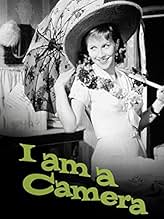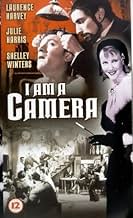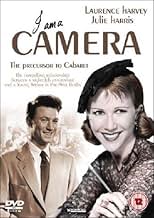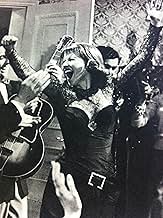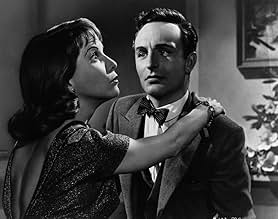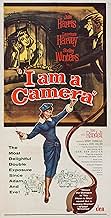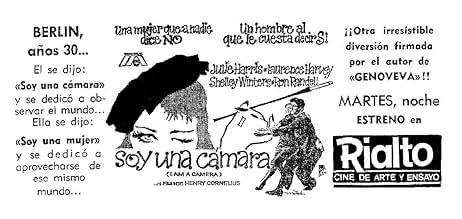Agrega una trama en tu idiomaIn Weimar-era Berlin, an aspiring writer strikes up a friendship with a vivacious, penniless singer.In Weimar-era Berlin, an aspiring writer strikes up a friendship with a vivacious, penniless singer.In Weimar-era Berlin, an aspiring writer strikes up a friendship with a vivacious, penniless singer.
- Dirección
- Guionistas
- Elenco
- Nominada a1 premio BAFTA
- 1 nominación en total
William Adams
- Old Doctor
- (sin créditos)
Ian Ainsley
- Minor Role
- (sin créditos)
Charles Andre
- Waiter
- (sin créditos)
Julia Arnall
- Model
- (sin créditos)
Jack Arrow
- Troika Doorman
- (sin créditos)
- Dirección
- Guionistas
- Todo el elenco y el equipo
- Producción, taquilla y más en IMDbPro
Opiniones destacadas
This British film version of the stage play I AM A CAMERA is based on Christopher Isherwood's "Berlin Stories." This is the source material for the famous musical CABARET.
Julie Harris, a major stage actress of her day, reprises her 1951 Tony Award winning role as Sally Bowles. She's a far cry from the Liza Minnelli character but the basic "Sally" is all here despite the various film codes that would have blocked this story from being filmed in Hollywood. Harris is perhaps stagy but she's also quite good as the madcap and maddening Sally. Her singing number is obviously dubbed (by Marlene Dietrich no less) although Harris apparently sings for herself in other moments.
Laurence Harvey (with the very ugly hair) plays Isherwood with zero charm and can't even make the character interesting. Shelley Winters does little with the role of Natalia (Marian Winters won a supporting Tony for the play), and Anton Diffring is OK as Fritz. Ron Randell plays the caddish Clive but seems a tad loud. Lee Seidl is funny as the landlady.
Yet despite the overall staginess and cheap look, Harris takes center stage and she is amazing. This film was released the same year as EAST OF EDEN in which Harris gives a glowing performance as Abra. Comparing the two performances gives a good look at the talent Miss Harris possesses. These two characters couldn't be more unalike. Harris' Sally preens and prances about and growls out a very lascivious laugh. She also acts circles around the boring Harvey.
Without the music and with a familiar storyline, many viewers may find little here to recommend this film, but it's a great chance to see the great Julie Harris repeating what was probably a very shocking role in 1951.
Julie Harris, a major stage actress of her day, reprises her 1951 Tony Award winning role as Sally Bowles. She's a far cry from the Liza Minnelli character but the basic "Sally" is all here despite the various film codes that would have blocked this story from being filmed in Hollywood. Harris is perhaps stagy but she's also quite good as the madcap and maddening Sally. Her singing number is obviously dubbed (by Marlene Dietrich no less) although Harris apparently sings for herself in other moments.
Laurence Harvey (with the very ugly hair) plays Isherwood with zero charm and can't even make the character interesting. Shelley Winters does little with the role of Natalia (Marian Winters won a supporting Tony for the play), and Anton Diffring is OK as Fritz. Ron Randell plays the caddish Clive but seems a tad loud. Lee Seidl is funny as the landlady.
Yet despite the overall staginess and cheap look, Harris takes center stage and she is amazing. This film was released the same year as EAST OF EDEN in which Harris gives a glowing performance as Abra. Comparing the two performances gives a good look at the talent Miss Harris possesses. These two characters couldn't be more unalike. Harris' Sally preens and prances about and growls out a very lascivious laugh. She also acts circles around the boring Harvey.
Without the music and with a familiar storyline, many viewers may find little here to recommend this film, but it's a great chance to see the great Julie Harris repeating what was probably a very shocking role in 1951.
In Isherwood's preface to his "Berlin Stories" he talks about meeting Julie Harris backstage during "Camera's" Broadway run, and seeing her as the quintessential Sally Bowles. Maybe he was being gracious, but we couldn't have agreed more. Filled with witty dialogue, this film moved at a brisk pace, and yet when it was over, we felt as if we had seen an in depth slice of the demimonde life in pre-war Berlin. Harris was simply fascinating - what a beautiful smile! Highly recommended (if you can find it) for those who find this time and place irresistible.
Nice details too, including quick shots of Berlin "boot-girls" (dominatrix ladies of the night) and the El Dorado, one of the city's most colorful transvestite bars (even the murals inside are spot on!)
Nice details too, including quick shots of Berlin "boot-girls" (dominatrix ladies of the night) and the El Dorado, one of the city's most colorful transvestite bars (even the murals inside are spot on!)
In this film Julie Harris reprises her Tony award-winning performance as Sally Bowles bumming in 1920s Berlin. I loved Julie and envied Sally and her carefree ways, but I was young then. While the film may not be "important," it does tell us something about life and culture based upon Christopher Isherwood's evocation of fun-loving pre-Hitler Berlin. It's about a world and time long vanished & highly lamented by aging romantics such as I. So temper your critical faculties and just enjoy a stunning performance by Julie Harris who has won more Tony Awards (5) than any other actress.
With two shining stars such as Julie Harris (the Julie Andrews of the 50s), and Lawrence Harvey, this film was almost guaranteed to be a success. The film is not as graphic as the later, superior production, but it is fun to watch, nevertheless. Even Shelley Winters gives a decent performance for a change (oh no, my harshest critic will be offended!). The Harvey character was supposed to be gay, which the latter production made clear, but during this film period, that issue was pretty much taboo in movies. The film has a Capraesque feel to it, and yet it has a few serious moments as well. I am restricted in my use of the word recommended by my critic, but I am going to use it anyway.
Unfortunately for Henry Cornelius's "I am a Camera" and its delightful star, Julie Harris, that film will forever lie in the shadow of Bob Fosse's Oscar-winning musical, "Cabaret." This 1955 film, the 1972 Fosse musical, the original 1951 stage play, and the 1966 Kander and Ebb Broadway musical were all based on stories by Christopher Isherwood; the tales relate the writer's time spent in Berlin during the early 1930's, where he met and enjoyed a platonic relationship with the irrepressible Sally Bowles, a cabaret singer and aspiring film star. Bookended by Isherwood in voice-over recalling Bowles and Berlin to colleagues at a reception for the publication of Bowles's memoirs, "I am a Camera" is a highly enjoyable movie that has unjustly been eclipsed by the subsequent musical version.
Comparisons between the two movie versions are inescapable. "I am a Camera" was filmed late in period when the Motion Picture Production Code and the Legion of Decency ruled Hollywood; any mention of homosexuality, bisexuality, promiscuity, or abortion were forbidden, and those subjects are only alluded to with veiled references. However, by the time Fosse filmed the musical remake, the Code and the Legion were history, and, in "Cabaret," Christopher openly liked boys, Sally had an abortion, and Sally's straight boyfriend, Clive, in the earlier film, had become the bisexual Maximilian von Heune, who bedded both Sally and Chris. Although the rise of the Nazis and anti-Semitism were depicted in both films, "Cabaret" hit the subject with more force.
Julie Harris created Sally Bowles on stage, and her performance in "I am a Camera" is wonderful; she is alternately touching, exasperating, thoughtless, endearing, and always flamboyant as a nightclub singer of lesser talent, who dreams of big things, but always chooses the wrong men in her pursuit of the good life. Laurence Harvey is quite good in the less showy role of Chris; his overlong pouffed hair, prudishness, and indifference to Harris's physical charms wordlessly suggest his sexual orientation. Anton Diffring and Shelley Winters are also effective as the Jewish lovers, Fritz and Natalia, who cautiously court, while the threat of Naziism swirls around them. Ron Randell is also fine as Clive, Sally's wealthy party-loving beau.
Although short and censored, "I am a Camera" is possibly truer to Isherwood's stories and the real Sally than was "Cabaret." Based on a play by John van Druten, John Collier adapted and likely sanitized Isherwood for the screen. Shot in black and white by Guy Green, the film retains some staginess, but maintains a decent pace. However, most importantly, "I am a Camera" preserves the Julie Harris performance that created the unforgettable Sally Bowles.
Comparisons between the two movie versions are inescapable. "I am a Camera" was filmed late in period when the Motion Picture Production Code and the Legion of Decency ruled Hollywood; any mention of homosexuality, bisexuality, promiscuity, or abortion were forbidden, and those subjects are only alluded to with veiled references. However, by the time Fosse filmed the musical remake, the Code and the Legion were history, and, in "Cabaret," Christopher openly liked boys, Sally had an abortion, and Sally's straight boyfriend, Clive, in the earlier film, had become the bisexual Maximilian von Heune, who bedded both Sally and Chris. Although the rise of the Nazis and anti-Semitism were depicted in both films, "Cabaret" hit the subject with more force.
Julie Harris created Sally Bowles on stage, and her performance in "I am a Camera" is wonderful; she is alternately touching, exasperating, thoughtless, endearing, and always flamboyant as a nightclub singer of lesser talent, who dreams of big things, but always chooses the wrong men in her pursuit of the good life. Laurence Harvey is quite good in the less showy role of Chris; his overlong pouffed hair, prudishness, and indifference to Harris's physical charms wordlessly suggest his sexual orientation. Anton Diffring and Shelley Winters are also effective as the Jewish lovers, Fritz and Natalia, who cautiously court, while the threat of Naziism swirls around them. Ron Randell is also fine as Clive, Sally's wealthy party-loving beau.
Although short and censored, "I am a Camera" is possibly truer to Isherwood's stories and the real Sally than was "Cabaret." Based on a play by John van Druten, John Collier adapted and likely sanitized Isherwood for the screen. Shot in black and white by Guy Green, the film retains some staginess, but maintains a decent pace. However, most importantly, "I am a Camera" preserves the Julie Harris performance that created the unforgettable Sally Bowles.
¿Sabías que…?
- TriviaDespite being far less salacious than the 1951 stage play on which it was based, this film adaptation received a "Condemned" rating from the Legion of Decency, a Roman Catholic organization that passed moral judgments on films between 1933 and 1965. This rating was also given to Psicosis (1960), Una Eva y dos Adanes (1959) and Sin aliento (1960).
- ErroresWhilst most of the film is a flashback set in the early 1930s, all the costumes and hairstyles worn are straight out of the early 1950s.
- Citas
Christopher Isherwood: [to Sally] Any mess you get into, you try and get out of by using your extremely inadequate sex appeal.
- Créditos curiososIn opening credits, Shelley Winters is misspelled "Shelly".
- ConexionesFeatured in Omnibus: Christopher Isherwood: A Born Foreigner (1969)
- Bandas sonorasI Saw Him in a Café in Berlin
(uncredited)
Music by Ralph Maria Siegel
English lyrics by Paul Dehn
Sung by Liselotte Malkowsky
[Sally (Julie Harris) sings the song in her club act]
Selecciones populares
Inicia sesión para calificar y agrega a la lista de videos para obtener recomendaciones personalizadas
- How long is I Am a Camera?Con tecnología de Alexa
Detalles
- Tiempo de ejecución1 hora 38 minutos
- Color
- Relación de aspecto
- 1.37 : 1
Contribuir a esta página
Sugiere una edición o agrega el contenido que falta

Principales brechas de datos
By what name was I Am a Camera (1955) officially released in India in English?
Responda

